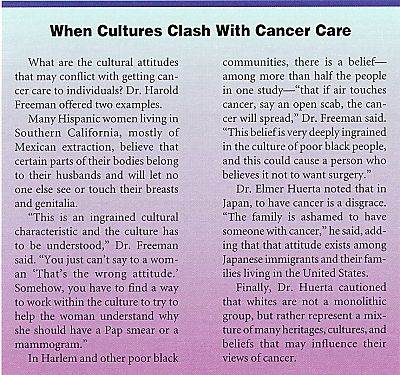NCI Targets Cancer Disparities With Community-Based Programs
WASHINGTON-In an effort to better understand and deal with the unequal burden of cancer among various subgroups of US residents, the National Cancer Institute has launched a program to engage members of these minority and underserved populations in community-based cancer control, prevention, research, and training projects.
WASHINGTONIn an effort to better understand and deal with the unequal burden of cancer among various subgroups of US residents, the National Cancer Institute has launched a program to engage members of these minority and underserved populations in community-based cancer control, prevention, research, and training projects.
According to NCI, it will be the first time that Asian Americans, Pacific Islanders, Native Americans, and underserved groups such as the rural poor will participate in grants for cancer awareness activities and research projects specific to their communities.

Seventeen institutions will share $60 million over 5 years to fund the 18 projects in the program, called the Special Populations Networks for Cancer Awareness Research and Training. As part of the effort, NCI will establish a cancer control academy on the National Institutes of Health campus to provide training and continuing education programs in cancer control.
The program seeks to build a new type of community infrastructure for awareness, for research, and for training, NCI director Richard D. Klausner, MD, said at a press conference to announce the new effort. If successful, these new infrastructures will be both community laboratories and community vehicles for raising awareness and effecting change through meaningful, appropriate, and effective communications.
Although overall cancer incidence and mortality have declined in recent years, great differences exist among and within the various ethnic and cultural groups that make up the US population. Poverty and inadequate access to medical care clearly play a significant role in these disparities. However, other factors, often cultural, also contribute to the nationwide problem.
The unequal burden of cancer is manifested through all aspects of cancer, from risk factors, to incidence, to outcome, to individuals experience of the disease, Dr. Klausner noted. This initiative is about dramatically broadening the National Cancer Program. This is about bringing [minority and underserved] communities into scientific, medical research, and cancer control activities across the country.
A key goal of the program is to ferret out and learn how to deal with cultural attitudes that dissuade or inhibit people from ending risky behavior, participating in screening procedures, or seeking treatment. Harold P. Freeman, MD, president and chief executive officer of North General Hospital, New York, and chairman of the Presidents Cancer Panel, drew a distinction between culture and race.
Culture has to do with people who have similar communications systems, who live in a similar physical environment, who have the same values, the same beliefs, the same world view, he said. If we do not understand the cultures of America and the interface between culture and poverty, we cannot fundamentally solve the cancer problems.
Projects receiving funds under the NCI program include the Pacific Islander Cancer Control Network in California, the National Black Leadership Initiative on Cancer, and the Latino/a Research and Policy Center in Denver. Among the other projects are the Native Hawaiian Cancer Research and Training Network, the Appalachia Cancer Network, the East Harlem Partnership for Cancer Awareness in New York City, and the American Indian and Alaska Native Initiative on Cancer.
Three Overlapping Phases
The projects will have three overlapping phases. In the first year, a variety of cancer awareness activities will be implemented, and community organizations will join with private and public sector groups to develop plans for specific community-based projects. In the second and third years, efforts will focus on increasing the number of minorities participating in cancer clinical trials, improving the training of minority scientists, and developing pilot projects within the community. The final 2 years will emphasize development of the programs infrastructure and using information gained from the pilot project to develop investigator-initiated applications for research grants.
Cancer research not only means laboratories, mice, monoclonal antibodies, and molecular biology, it also means seeking to understand the profound and sometimes elusive reasons why a person accepts or rejects certain behaviors that can affect his or her health, said Elmer E. Huerta, MD, MPH, director of the Cancer Risk Assessment and Screening Center, Washington Hospital Center, Washington, DC.